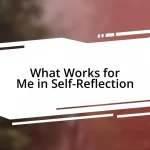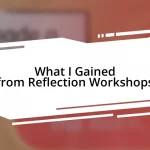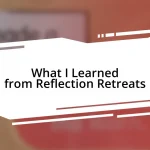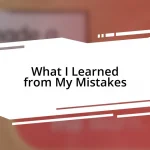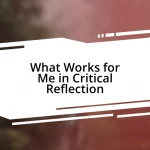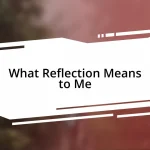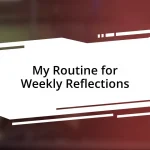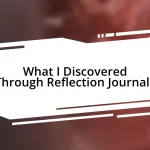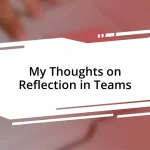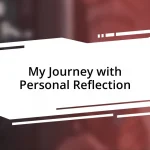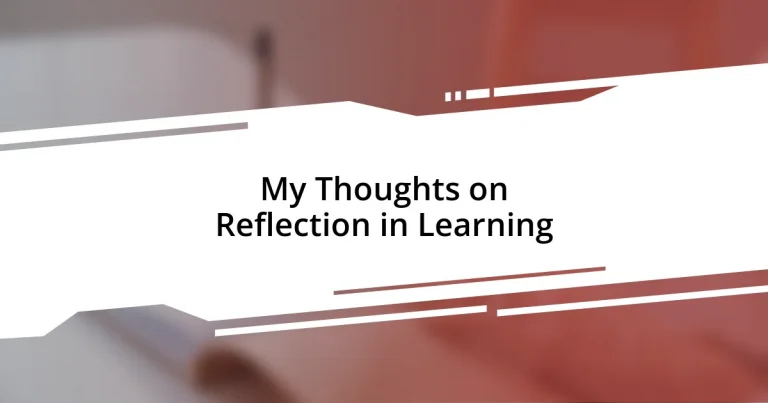Key takeaways:
- Reflection in learning enhances critical thinking, personal growth, and emotional resilience, making it an essential educational practice.
- Effective reflection techniques include guided questions, peer discussions, and a structured routine to deepen insights and understanding.
- Common challenges of reflection include overthinking, time constraints, and self-criticism, which can hinder personal development.
- Encouraging a reflective mindset can be fostered through journaling, creating supportive social circles, and embracing vulnerability in sharing experiences.
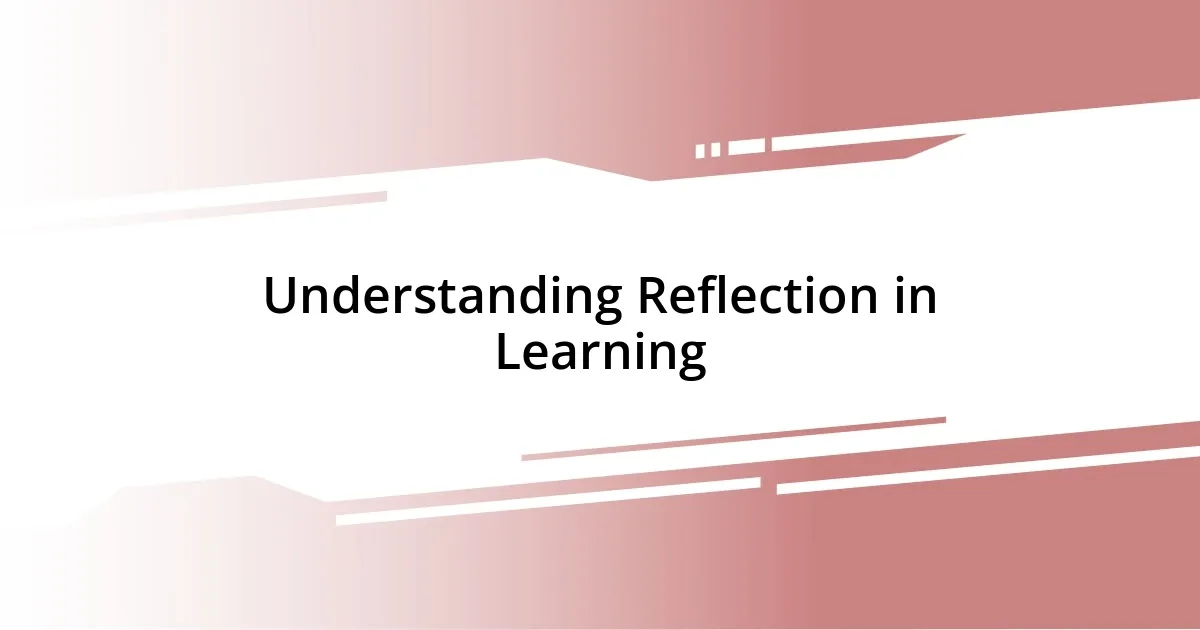
Understanding Reflection in Learning
Reflection in learning is more than just a routine activity; it’s a powerful tool that transforms our educational experiences. I remember a time when I stumbled across this concept during a particularly challenging project at work. As I took the time to reflect on what I had learned, I realized not only my strengths but also areas where I could improve. Have you ever felt that spark of clarity after mulling over an experience?
When we engage in reflection, we allow our thoughts to organize themselves and uncover deeper insights. I often jot down my thoughts in a journal to help articulate my feelings about a learning experience. That moment of writing becomes a dialogue with myself. It’s as if I’m asking, “What did this teach me?” and “How can I use this in the future?” This process has led to significant breakthroughs in my understanding and practice.
Understanding reflection in learning also fosters a deeper emotional connection to our experiences. I’ve found that by recognizing both successes and setbacks, I can appreciate the journey instead of just the destination. Isn’t it fascinating how our feelings can guide our learning? Reflecting helps us honor our growth, making learning a multidimensional experience.
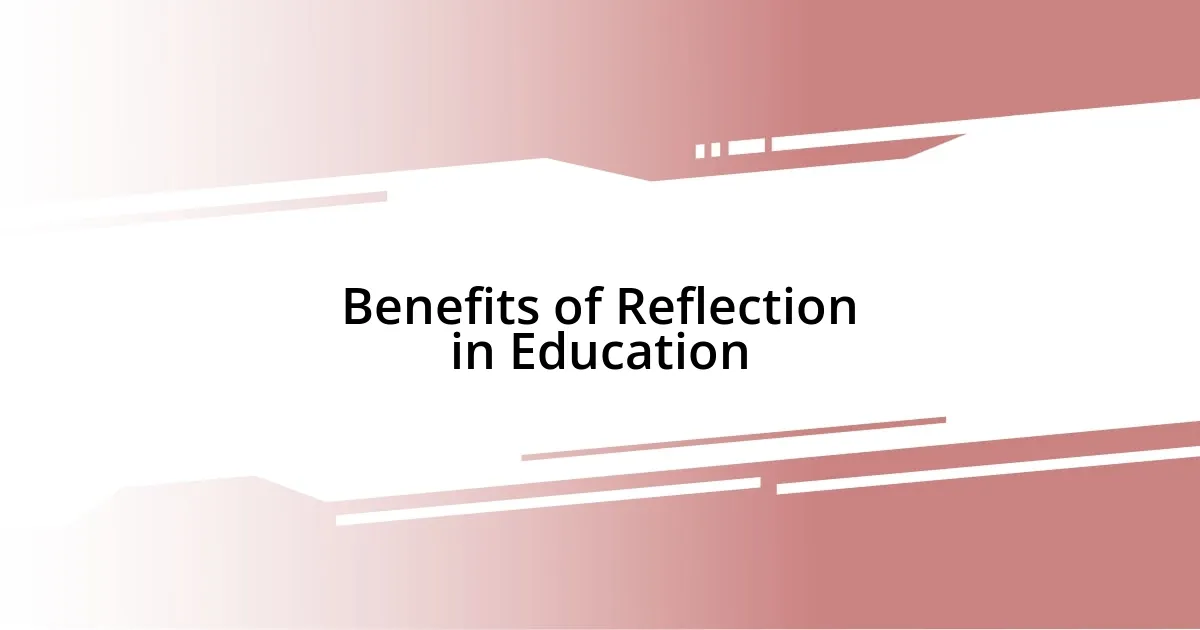
Benefits of Reflection in Education
Reflecting on our educational experiences yields significant benefits that enhance both personal and academic growth. I recall a semester when I felt overwhelmed by numerous assignments. Instead of merely pushing through, I took a moment to reflect on my progress weekly. This simple practice not only alleviated my stress but also helped me identify effective study techniques tailored to my learning style, ultimately improving my grades and boosting my confidence.
The benefits of reflection in education can be distilled into several key points:
- Enhanced critical thinking: It encourages learners to analyze and evaluate their own thoughts and actions.
- Personalized learning: Reflection allows individuals to tailor their study methods to what truly works for them.
- Goal setting: I’ve seen how reflecting on past performances can lead to setting more achievable and relevant future goals.
- Emotional resilience: Engaging in reflection helps to process emotions tied to successes and failures, fostering a more resilient mindset.
- Deeper engagement: Reflective practices deepen the connection to the learning material, making education feel more meaningful.
Each of these points highlights how reflection is a fundamental component of effective learning, making it an essential practice for anyone seeking to grow.
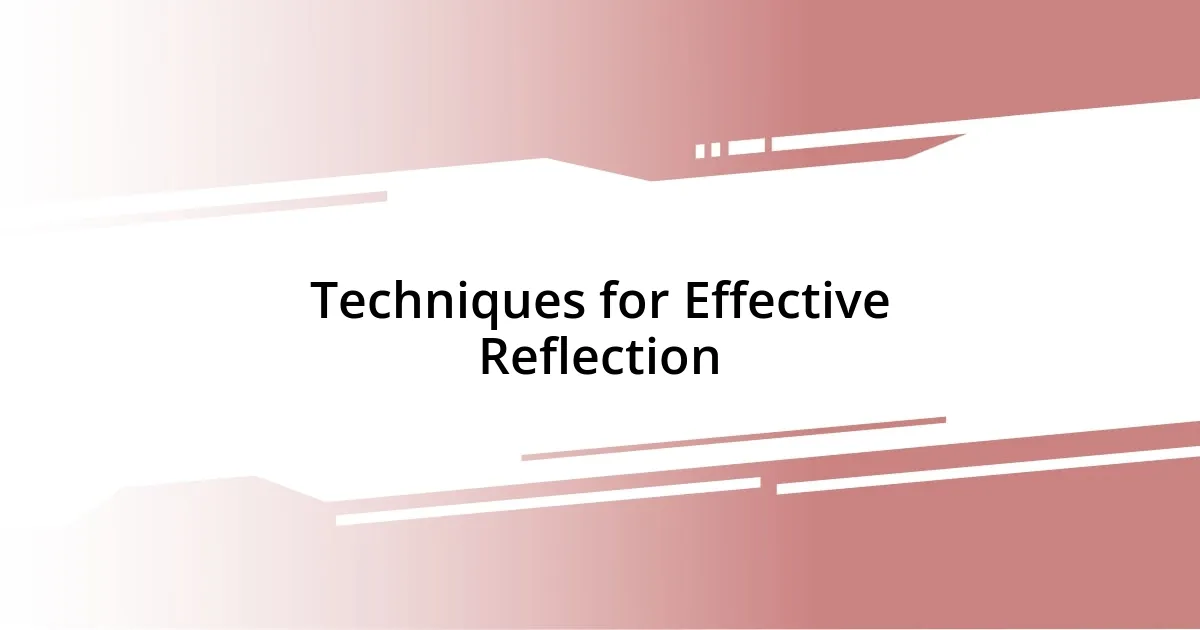
Techniques for Effective Reflection
Engaging in effective reflection can significantly enhance our learning experiences. One technique I find particularly helpful is the use of guided questions. When I ended a project recently, I asked myself, “What were the highlights? What surprised me?” These questions led me to insights that I wouldn’t have considered otherwise. It amazes me how a few thoughtfully crafted questions can shine a light on overlooked aspects of my learning journey.
Another technique I’ve incorporated is peer discussions. I remember a time when my colleagues and I sat down after a workshop to share our takeaways. Listening to their perspectives not only broadened my understanding but also inspired me to rethink my approach. It’s fascinating how collective reflection can stimulate new ideas and foster a richer learning environment.
Finally, creating a structured reflection routine can be incredibly effective. For instance, I dedicate Friday afternoons to reflect on my week. This ritual offers me a moment to synthesize my accomplishments and setbacks. Often, I jot down my thoughts in a dedicated notebook. This simple act of reflection not only grounds me but helps me enter the next week with clarity and intention. I encourage you to find a reflective practice that resonates with you, as it can truly transform your approach to learning.
| Technique | Description |
|---|---|
| Guided Questions | Responding to curated questions can help uncover valuable insights from experiences. |
| Peer Discussions | Sharing thoughts with others enhances understanding and inspires new perspectives. |
| Structured Reflection Routine | Setting aside dedicated time for reflection fosters clarity and purposeful learning. |
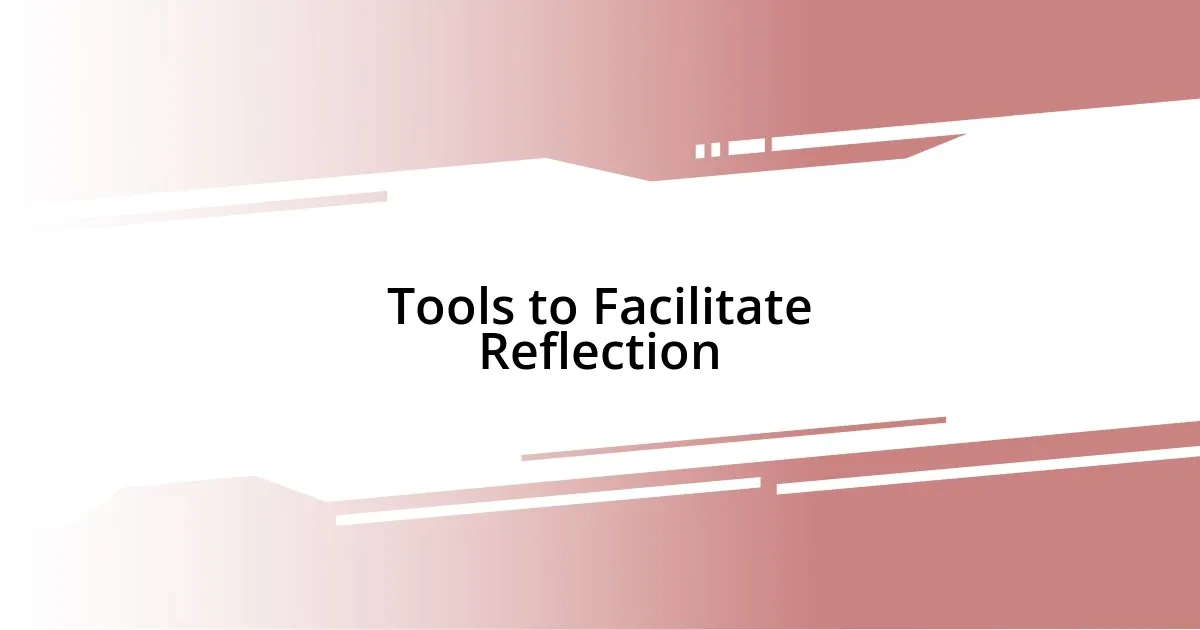
Tools to Facilitate Reflection
One of the tools I’ve come to appreciate for facilitating reflection is a personal journal. I still remember the first time I wrote my thoughts right after a challenging exam. That initial rush of emotions—anxiety mixed with hope—poured out onto the pages. As I reread those entries later, I discovered valuable themes in my responses to stress and found patterns that helped me prepare more effectively for future tests. Have you ever tried journaling your experiences? It’s insightful how capturing your thoughts can map out your growth over time.
I also find digital apps incredibly useful for reflection. Apps like Day One or Journey allow you to document your experiences on the go, ensuring that inspiration doesn’t slip away in the hustle of the day. One time, I was out for a walk when a realization hit me: I had been too focused on grades and not enough on the learning itself. So, I quickly opened my app and jotted down my insights. It felt liberating to articulate that shift in mindset instantly, showing me that reflection can happen anywhere, anytime.
Lastly, visual tools like mind maps have transformed my reflective practice. I recall a project where I was unsure of the next steps. By mapping out my ideas visually, I could see connections between concepts I hadn’t noticed before. It’s like piecing together a puzzle—I felt a sense of achievement as it all started to make sense. Have you explored visual thinking? It can be a game-changer for digesting complex information and enhancing clarity in your reflections.
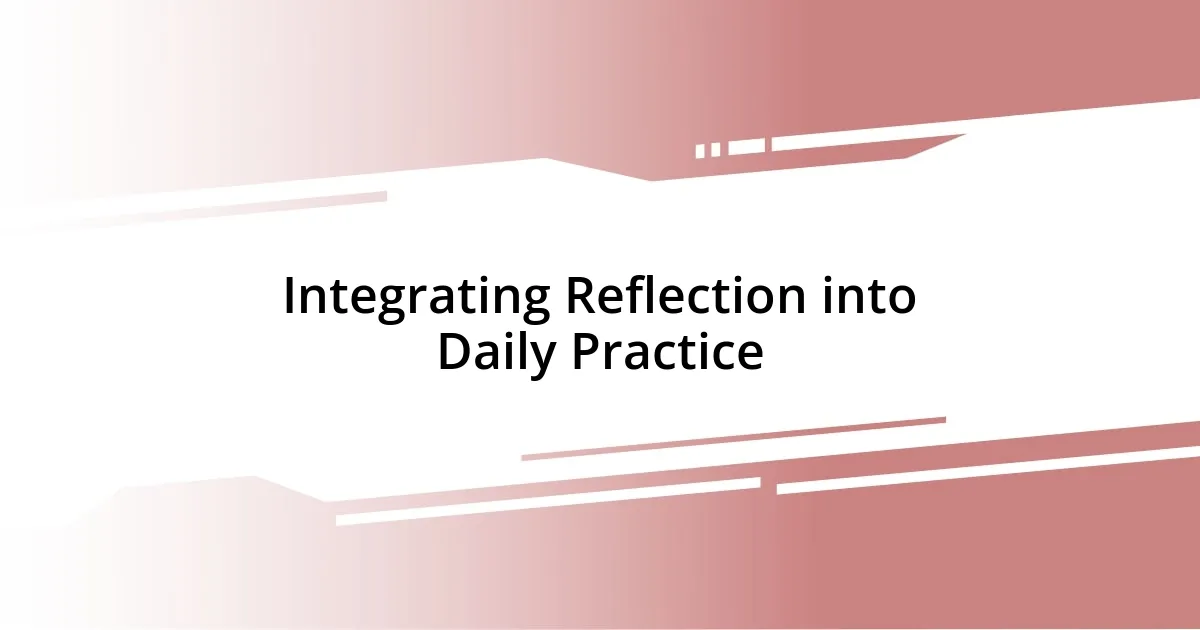
Integrating Reflection into Daily Practice
Integrating reflection into daily practice doesn’t have to be a chore; it can be a joyful ritual. For me, every morning starts with a simple five-minute reflection on yesterday’s events. As I sip my coffee, I think about what went well and what I could improve. It’s amazing how these few moments help me carry a mindful attitude throughout the day. Have you ever noticed how a bit of reflection can completely shift your mindset?
I also believe in the power of moments of stillness. After a long day, I often take a walk and let my thoughts wander. I remember a particular evening when the sunset caught my eye, and I found myself contemplating my experiences. That quiet time turned into a spontaneous reflection session where I processed my feelings about a recent challenge at work. Isn’t it interesting how nature can prompt us to reflect deeply without even realizing it?
Incorporating reflection into team meetings has been transformative as well. I recall a time when our team leader encouraged us to share our learnings at the end of each session. Initially, it felt awkward, but soon those moments became golden opportunities for growth. We discovered that discussing our lessons not only reinforced our learning but also built a stronger connection among us. Reflecting together can create a collaborative spirit—have you tried this approach in your own team?
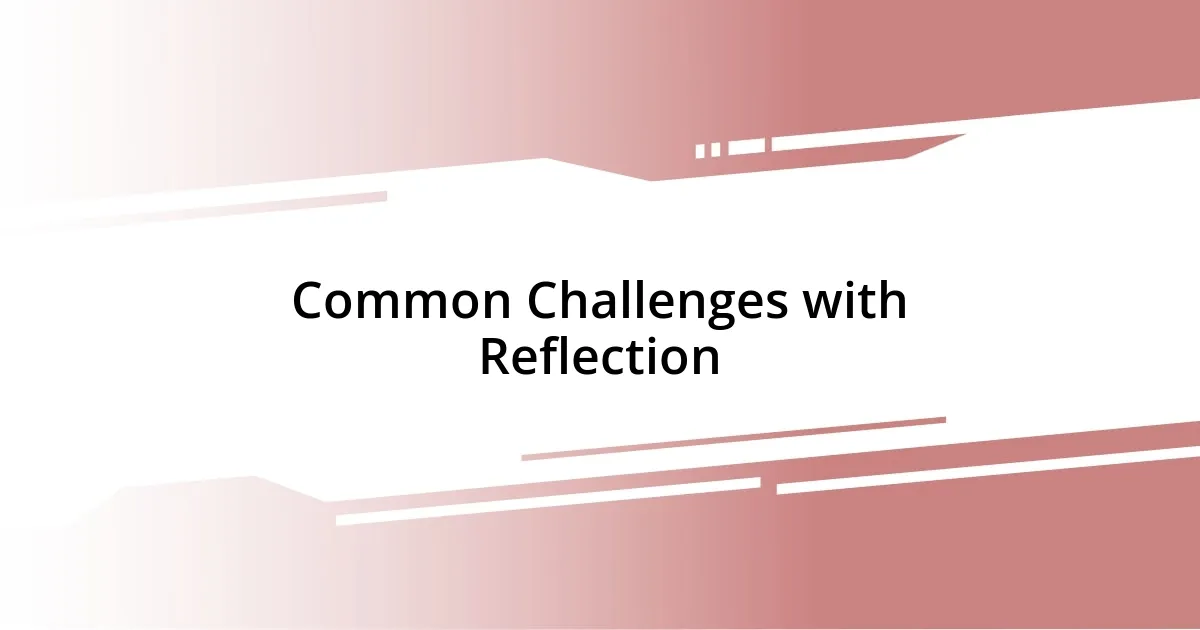
Common Challenges with Reflection
Reflection, while essential for learning, often brings its share of challenges. Sometimes, I find myself stuck in a loop of overthinking. For instance, during my last group project, I struggled to pinpoint what went wrong because I was so focused on the negatives that I couldn’t see the positives. Have you ever faced this kind of mental block? It can be frustrating when you know reflection is beneficial, yet feel paralyzed by self-doubt.
Another hurdle I encounter is finding the time for reflection amidst a chaotic schedule. I remember a particularly hectic week where I had assignments piled up, leaving no space for contemplation. Instead of viewing reflection as a priority, I pushed it aside, only to feel overwhelmed later. Does this resonate with you? It’s easy to let the busyness of life overshadow the importance of pausing to reflect on our experiences.
Lastly, I often grapple with being too critical of myself during reflection. There have been times when I scrutinized each decision I made, leading to a sense of inadequacy instead of growth. I recall a moment after a presentation where I focused solely on my mistakes rather than celebrating the effort I put in. Reflection should promote learning, not self-criticism—have you found a balance in your own reflective practices? It’s vital to shift our mindset toward constructive reflection to truly foster personal and educational growth.
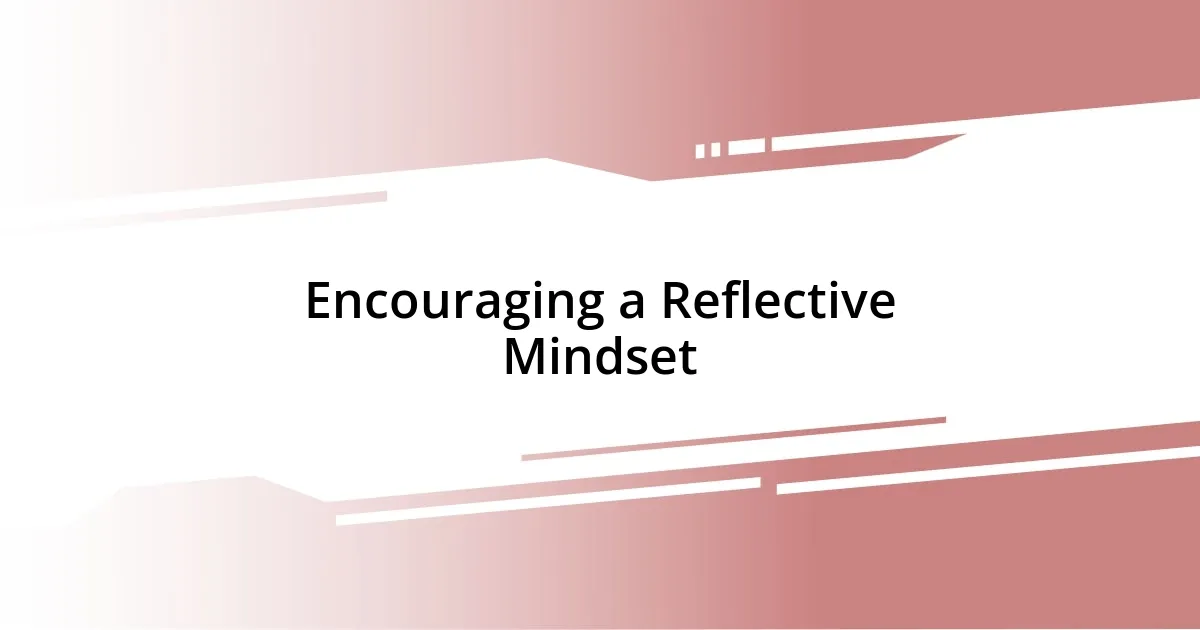
Encouraging a Reflective Mindset
One of the most effective ways I’ve found to encourage a reflective mindset is through journaling. Each night, I sit down with a notebook and jot down my thoughts about the day, highlighting moments that sparked joy or frustration. This simple practice has not only helped me clarify my emotions but also provided a tangible way to track my growth over time. Have you ever tried putting your thoughts on paper? It can be incredibly revealing.
Additionally, I like to create a reflective culture within my circle of friends. Sometimes, we gather around for a casual dinner, and I’ll suggest we share a highlight and a challenge from the week. I was surprised by how many deeper connections we built simply by sharing personal stories. It’s as if those moments unfold new layers of understanding about one another. How do you foster reflection in your relationships?
I also believe that embracing vulnerability is key to a reflective mindset. There was a period when I hesitated to admit my struggles, thinking it would make me seem less competent. However, once I started opening up about my failures, I noticed not only personal growth but also that it encouraged others to do the same. Isn’t it fascinating how vulnerability can become a bridge to authenticity for us all? This has taught me that reflecting isn’t just about self-examination; it’s also about connecting with others on a deeper level.

